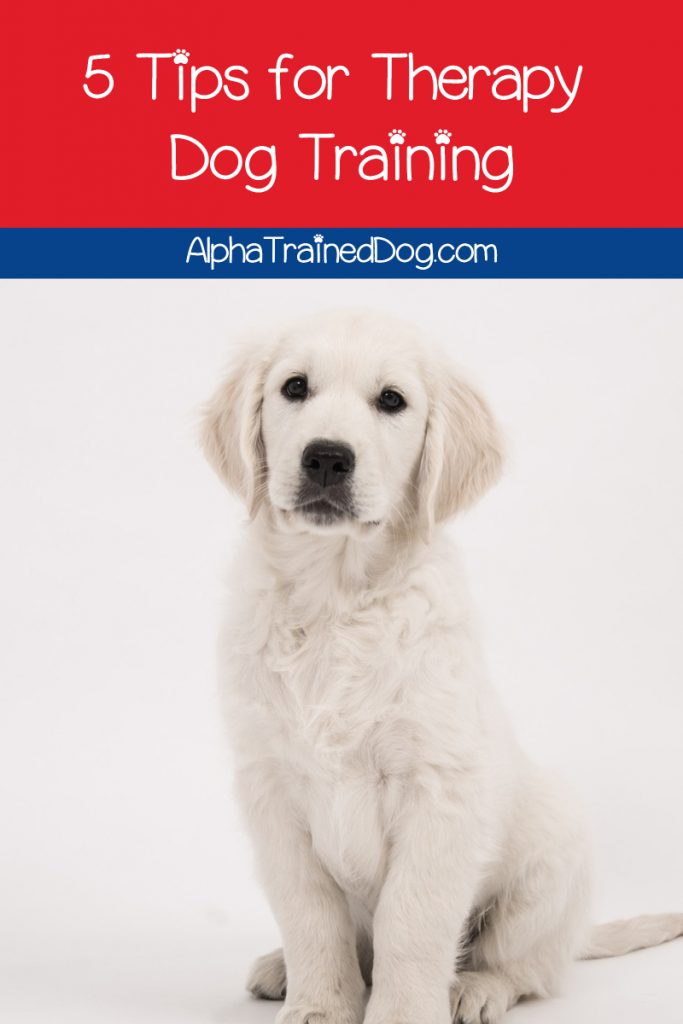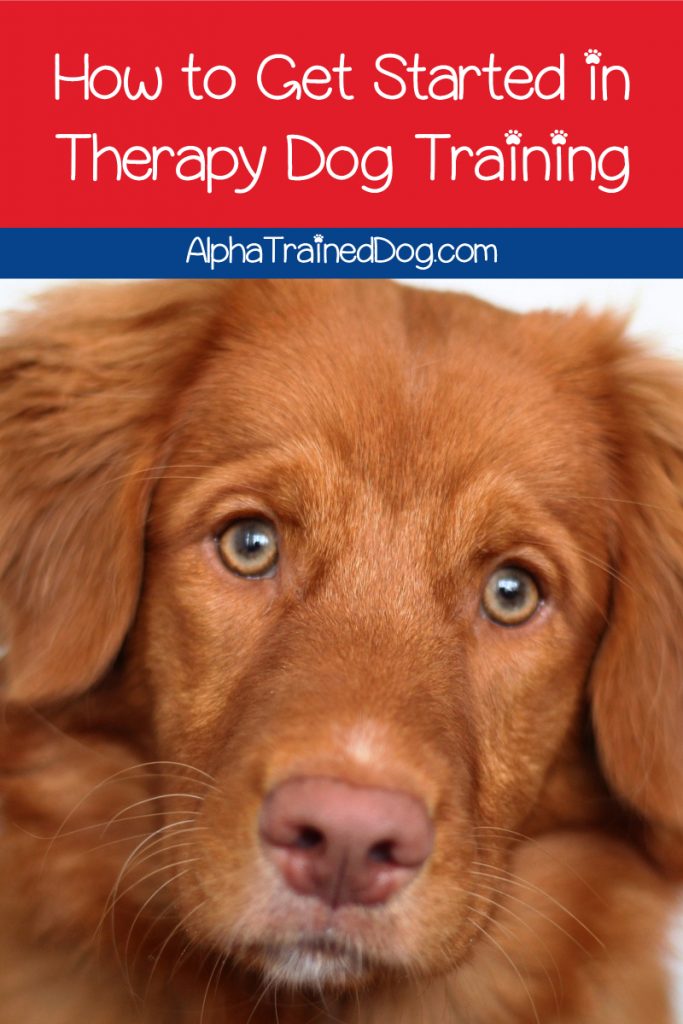If you’re thinking of giving therapy dog training a go, good for you!
Therapy dogs bring so much joy to people just when they need it most.
I’ve got you covered with 5 training tips and tricks to prepare your pooch for the role of a therapy dog.
Let’s check them out!

5 Tips for Therapy Dog Training
Dog owners have known for a long time how beneficial dogs are when you’re dealing with anxiety and stress.
So, it’s not surprising that the popularity of therapy dogs is rising in our busier than ever world.
Therapy dogs are different from service dogs, so you shouldn’t mix the two.
- Therapy dogs visit people in hospitals, nursing homes, or schools.
- Service dogs help people with certain disabilities navigate day-to-day life
Technically, therapy dogs don’t require certification. However, most hospitals and schools DO ask to see some sort of proof of training.
So I’m going to walk you through some of the most important things that you need to teach your dog to qualify as a therapy dog.

#1 Socialize Your Puppy
If you want to therapy train your dog, your first step in the process is socialization.
All dogs need socialization to function in the human world and to be comfortable around various sounds, sights, smells, and people.
Therapy dogs require even more socialization because they’re going to meet a lot of different people in different locations and settings.
These dogs should have as many pleasant meetings with children and “strange” adults with mustaches, hats, glasses, and uniforms.
Unfortunately, any negative experiences during the socialization process might influence your dog’s behavior forever and make them unfit for therapy.
That’s why you have to a good socialization plan and be prepared that things won’t always go as you expected them to.
In addition to this, having short, positive socialization episodes is better than overwhelming your puppy.
Puppy training classes are also an excellent idea because they’ll teach your puppy some manners.
When you’re socializing your puppy, you should also involve the whole family in the process.
In this way, your dog will get more exposure to different stimuli and get comfortable being affectionate with more than one person.
Check out the video below for tips on socializing your dog.
#2 Establish Trust
A therapy dog works alongside their humans. As such, your puppy should trust your judgment and respond to your cues without hesitation.
People often say that trust is hard to earn and easy to lose. That’s true for your dog as well.
You have to be consistent in how you treat your dog and always rely on positive reinforcement. Discover what your dog likes to do and do activities that both of you love.
If your puppy/dog seems uncomfortable or afraid in certain situations, you should take measures to lessen your dog’s discomfort and protect them whenever necessary.
That will show your dog that you will always make the best decisions and that you have their interest in mind.
Shouting or punishing your dog will affect their whole temperament and make them skittish. That’s something you want to avoid in therapy dog training.
#3 Start Basic Training
Obtaining the AKC Canine Good Citizen title is one of the steps that will help your pooch qualify as a therapy dog. Most organizations either require it or have another similar test to judge your dog’s suitability.
The sooner you start obedience training, the better. It not only strengthens the bond between you and your dog, but it also prevents dogs from picking up bad habits.
You’ll want your dog to teach your dog to respond to their name and the most basic commands such as “sit,” “stay,” “lay down,” “leave it” and “watch me,” among few.
You have to work on these commands until you master them in such a way that the dog responds without hesitation even when distracted.
#4 Judge Whether Your Dog Will Make a Good Therapy Dog
Unfortunately, not all dogs are suitable for therapy dogs. Sometimes it’s because the dog isn’t socialized properly or has had too many negative experiences.
Other times, the dog has a mistrusting personality or doesn’t want to be a therapy dog.
Some dog breeds, for example, Golden Retrievers and Labrador Retrievers make excellent therapy dogs due to their mellow temperament and cheerful nature.
However, any dog breed can qualify as long as they’re sociable, obedient, and interact well with children and adults.
To judge whether your dog will be a good therapy dog, you should answer these questions:
- Does your dog enjoy spending time with strangers?
- Does your pooch have a calm demeanor?
- How does your dog do in noisy situations or around equipment?
- Is your dog adaptable, or does he/she get easily startled?
- Is your dog obedient? Will he/she come on command, retrieve things, or lay down?
Organizations don’t allow puppies under one-year-old to be therapy dogs. So you have a lot of time to observe your pet’s personality and see if they have what it takes.
Furthermore, you have to make sure that your dog is healthy and up to all their vaccination shots. If your dog is sick or has a chronic condition, they might not be fit for therapy dogs.
#5 Enroll in Therapy Dog Training Classes
Before you attempt to take the therapy dog test, you can enroll in some therapy dog classes.
They’ll be beneficial not only for your dog but also for you because they’ll prepare you for what to expect when you start visitations.
Moreover, you’ll get to speak with other people training therapy dogs and see what it’s like to be a therapy dog handler.
These classes sometimes have dog therapy tests that will help you determine how suitable your pooch is for the job.
They’ll also provide help on how to register with a national organization once your dog has passed its tests.
No matter whether your dog gets qualified as a therapy dog, socialization, obedience training, and trust are necessary for a strong dog-owner bond. Otherwise, you won’t reap the full benefits of your relationship with your dog.


Trackbacks/Pingbacks